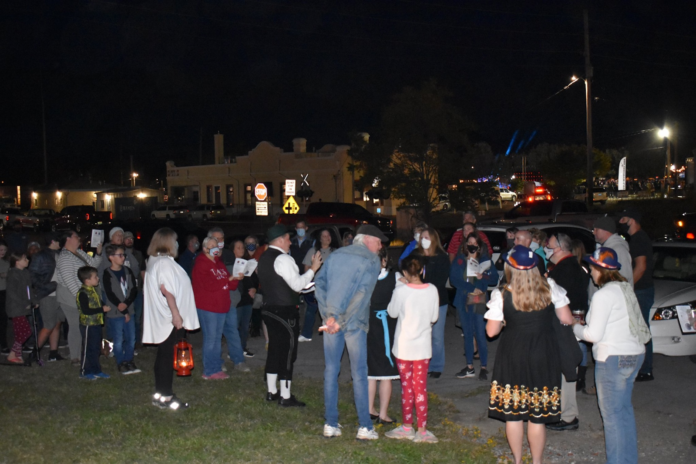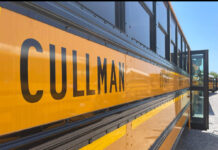
CULLMAN, Ala. – For the 11th consecutive year, Cullman’s Oktoberfest celebration- though condensed by COVID- featured an evening walking tour led by Michael Sullins and Julie Burks. Over 50 visitors followed Sullins and Burks across the tracks from the Cullman Depot, down 1st Avenue Southwest to 3rd Street (U.S. Highway 278), over to and back up 1st Avenue Southeast to the depot.
Kicking off at the depot, participants were given an overview of early Cullman history as told in an 1895 address by Mayor George Parker marking the 23rd anniversary of the city:
Today’s celebration is not only a joyous social and friendly reunion of our people with our friends from other places, but it is a milestone in the march of time, and marks an epoch in the history of our colony and county.
Prior to the completion of the South and North Railroad, in the fall of 1872, the territory comprising this county was little known. Here and there, the hardy pioneers coming from the older settled parts of the State, had penetrated the locality, and built their log houses and made for themselves homes in this almost wilderness. Their frights and adventures with the bears and wolves are now things of the past
In November of 1872, a middle aged German, with Mr. Albert Fink, who was then general manager of the Louisville & Nashville Railroad Company, and a few others, got off the train at Milner’s, two miles north of Cullman, which was the only station near here, and explored. The result of that visit was the determination on the part of that German, whose name is already upon your lips, Mr. John G. Cullmann, with the assistance, on the part of the Railroad Company through Mr. Fink, to plant a colony upon the vacant lands on this mountain plateau thus establishing the first successful colony in the state, and of the few within the Southern States.
In the Spring of 1873 five families were induced to come here from the rigorous climate of the Northern States. The first store was opened by G.A. Prinz, John Fromhold opened the first hotel, carpenters and other mechanics came in, and immigration to the new colony was fairly begun.
On March 6th, 1875 the Legislature of Alabama granted the first charter of the town of Cullman. The tide of immigration still continued to flow steadily this way, so that in this year, an attempt was made on the part of our citizens to have a new county made out of this territory by the legislature. This was unsuccessful. On the assembling of the Legislature in the fall of 1876, an organized effort was again made, and this time with such success that on the 24th day of January, 1877, the act was approved, creating the County of Cullman out of portions of Blount, Winston and Morgan counties. There was some violent opposition to the formation of this county in the Senate, headed by the Senator from this district, who stated on the floor of the Senate, that to make this County would be “building a poor house for the State to support.”
Participants were also introduced to members of Cullman Fire Rescue, who would accompany the tour in case anyone needed assistance, and given a brief history of the city’s fire service. Additionally, visitors met a representative of The Cullman Tribune and heard a little about the city’s oldest continuously operating business. Many of the stories that would be told during the tour were taken directly from the pages of The Tribune.
Along the tour, participants heard about:
- Cullman’s two train depots, including the first that sat across from Col. Cullman’s house, and the current depot completed in 1913, along with the railroad cut that necessitated the relocation. The presentation featured this Tribune note from 1912:
- Work Begins on New Depot – The excavation is being made for the foundation of the new L&N depot. Judging from the extent of the excavations being made, the passenger depot will be located on the south end and the warehouse will be considerably larger than the present structure. The new depot will be located upon the lot formerly occupied by the Standard Oil Company.
- Cullman Warehouse Company and Standard Laundry and Dry Cleaners, which once occupied the site of Depot Park
- The residential location and eventual site of Cullman local transportation hub W.C. Boub Livery Stable which, over the years, came to house the Cullman Fire Department, Cullman Power Board, City Hall, the Cullman County Museum, and now Cullman Economic Development Agency
- The Cullman Electric Light and Water Works, located at the present Festhalle site. The presentation featured this Tribune note from 1889:
- No longer a question; light and water are now a dead certain improvement – Work upon improvements is to begin within 3 months and the plant is to be in operation within nine months from the beginning of the work. Lights are to cost the city the sum of $50 per year. Incandescent lamps are to be furnished to private customers at a price not to exceed 75 cents per month with special rates to larger customers. The contract for the water works provides that the city shall be supplied with 700,000 gallons of good, pure, clear water every 24 hours.
- Col. Cullman’s four wagon-wide streets
- The Caspar Arnold and Son Planing Mill, which stood where Premier Bank stands today
- The 1916 earthquake felt in Cullman and across the region, noted in this 1916 Tribune Post:
- An Earthquake Shakes Cullman – Wednesday afternoon shortly after 4 o’clock Cullman was shaken terrifically by an earthquake. Buildings throughout the city were jarred and trembled from the great shock; minor material damage was done to multiple properties. The earthquake reached throughout the southern states but no heavy damage was done at any point.
- Note: A few people expressed skepticism at the notion of an Alabama earthquake, but the entire Appalachian region is seismically active. Cullman County was, in fact, also struck by minor quakes in 1981, 1989 (three separate events), 1991 (two events) and as recently as March 2018, when a 1.7 magnitude event hit the Walter community.
- Early west side landmarks the Arndt Saloon, Arnold House/Alabama Hotel, R.J. York Livery Stable and Mule Shed, Cotton and Farm Implement Warehouse and city jail, several of which were lost in a large 1894 fire. In talking about the jail, Sullins shared this 1894 Tribune story:
- Bob Knighten Still At Large. Leaves a Note to Jailor in Which He Tells How He Procured His Liberty Once More. Was Furnished a Saw by a Friend – Bob Knighten, who escaped jail here last Thursday night, is still at large. Following is a note, written on a piece of pasteboard, and left in his cell, which was found yesterday morning. “Cullman jail. Mr. Dunlap: Now I am going to leave you and will tell you how I got out. I have got a friend that came to see me while you was asleep. He gave me a saw and I did the work. I have got a good gun on me, so come on boys and let’s try it, and when you find me you will find more with me. You will find me up-to-date, and my friend with me to help. Good bye. Yours Truly, Robert Knighten.”
- Cullman County’s first courthouse, including this story from The Tribune:
- Judge refused to let them Marry – A young man of 17 summers and young maiden of about the same age were sorely disappointed on Tuesday of this week. They had come from Blount County to get married, and Judge Burke asked the young man. “How Old Are You?” “Just 17” Was the Reply. “Well You Are Too Young My Son” replied the Judge. Blushes spread over his face. The die was cast, and with a hesitating step and startled maiden; when the door opened they passed out into an unfeeling world.
- Additional west side businesses, many built after the 1894 fire: Koopman and Gerdis General Merchants Building, D.G. Clothing and Millinery, Eureka Hotel, Cullman Drug Store, McMinn’s Opera House, Watson’s Department Store, Strand Theater, Richter’s Saloon and Richter’s Hotel, Southern Express Company, The Democrat newspaper and Leeth National Bank
- Early east side landmarks, including the original depot site and Col. Cullmann’s home. Included in the presentation was Cullmann’s 1895 Tribune obituary
- John G. Cullmann Founder of City and County Is Dead. He expires Peacefully at His Cullman Home. Sketch of His Life – John Gottfried Cullmann who gave his name and the closing years of his life to one of the most thriving cities of this great commonwealth is no more. On Tuesday morning, the aged gentleman yielded to the blighting influence of old age and complete exhaustion, and at 5:20, quietly breathed his last. So peaceful was his death that it seemed that he merely went to sleep. He had been failing rapidly since Saturday, and it was apparent that this end was fast approaching. The weight of 72 years of active life had borne heavily upon him, and that peaceful contented spirit which has marked his entire career was even more fully pronounced in death. His funeral will take place this (Thursday) afternoon, at the public cemetery. Col. Cullmann leaves a will executed some years ago, by which he names Mr. G. A. Prinz as his executor, and bequeaths his entire estate to his wife who resides in Germany. Though he has accumulated considerable money in his lifetime, his estate which he leaves behind is not considered very large, though embracing considerable valuable property. His only living heirs are a widow, and one daughter, also a widow who resides in Europe.
- East side businesses Thompson Brothers Store, Robert Schaefer Home Heating, and early office of The Tribune, Mayo Beauty Shop and Barber Shop, Ward Jewelry Store, Princess Art Shop, Star Billiard Parlor, Hauk Building, Springer Hotel, Commercial Hotel, Peoples Drug Store, Tennessee Valley Bank, Palace Saloon, Hugh Brindley Grocery Store, Skipper and Eidson clothing store, City/Duchess Bakery, Merchants Hotel and A. Dreher and Co., Stiefelmeyer Building and home and Cullman Printing Company
- Several east side homes and businesses were destroyed in an 1892 fire reported in The Tribune:
- The fire last Friday night was the greatest calamity that has ever befallen our town. The large furniture factory with 1,000,000 feet of lumber, belonging to A. Dreher & Co, the Hotel Degarnette, run by Capt. Stone and belonging to Mrs. Merlett, the old Merchants’ Hotel, owner by Mrs. Weggerman, the law office of W.T.L. Cofer, Esqur., the Burr Store House, the private residence of A.J Vick, owned by C. Stiefelmeyer, the storehouse owned by C. Stiefelmeyer, were all swept away in a few short hour and by which no less than fifty employees were thrown out of business. The factory and costly machinery, of A. Dreher & Co. was a complete loss. Mrs. Merlett and Mr. Steifelmeyer, had a small insurance. Mr. Cofer and Mrs. Weggerman carried no insurance. The total loss will sum up not less than $60,000 and perhaps may reach $75,000. Most of the employees at the factory were dependent upon their wages for the support of their families and the loss will be felt, not only by individuals, but by the whole community.
Mayor Parker’s 1895 anniversary address concluded:
“Therefore today we present a population of Alabamians, Germans, Georgians and colonists, of fully fifteen thousand souls, we present a town of over two thousand; and we present numerous and flourishing villages all over our county, and we present an assessed value of property of $1,700,667.00 – four times what it was worth in 1877 – and this is the “poor house” that the State of Alabama created, when she formed the County of Cullman. We might well wish that Alabama had more such poor houses.
“And now Ladies and Gentlemen, Visitors and all, I again bid you a cordial welcome, to our City, and assure you that the latch string of every door is upon the outside, and not only that but that our doors are wide open, to receive you.”
Copyright 2020 Humble Roots, LLC. All Rights Reserved.
































